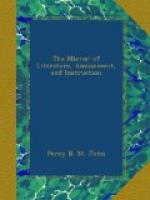even to jigs; and the natural result was an occasional
falling-out between the words and the melodies.
Judging that it would be better for those verses to
be regularly married to music, than that they should
form temporary connexions with any rambling tunes
about town, Mr. J. Blewitt has at last kindly provided
them with airs that are airs of character, and
made their alliance with music of the correct and
permanent kind. The same gentleman has undertaken
the same good office for the forthcoming Comic Ballads;
and his well-known skill and talent will insure that
all unhappy differences between Sound and Sense will
be amicably composed. In fact, the words and
the airs will be intended for each other from the
cradle—like Paul and Virginia. It is
intended that the new Ballads shall start in couples.
Two to make a Number, and a number of Numbers may be
bound to the library, as a volume, for a term
of years. The work will be set with variations.
Occasionally there will be a duet or trio, to accommodate
those timid vocalists who do not choose to make themselves
particular in a solo, or those other singers of sociable
habits who prefer giving tongue in a pack. One
word about the words. They will be “merry
and wise.” Not a jest will be admitted that
might be liable to misconstruction by the Council
of Nice. The Comic Muse has been too apt
to mistake liberty for license, and has been
proportionably licentious; the Comic Ballads
will be as particular as Seneca or Aesop in their
regard for good morals. Nothing, in short, will
be inserted but what is cut out for the female
ear. To conclude—the said Melodies
will be issued by Messrs. Clementi and Co., of Cheapside.
Be sure to ask for “Comic Melodies,” as
all others are counterfeits, and not benefits, to
the proprietors. The first Number is expected
to commence, like Blue Bonnets, with “March;”
and the work will be continued regularly through every
other month in the calendar.
* * * * *
The other day, a man of ninety-nine was buried at Pere-la-chaise, at Paris, and was followed to his grave by twenty children, fifteen grand-children and great grand-children. Happily, such populators are not common! The deceased, it appears, had buried six wives, and married the seventh: he died in the full enjoyment of his senses, and assured his numerous progeny that he did not regret life, as he knew he was about to rejoin the six beloved partners of his days, who had gone before him. Few men, we fear, would be consoled by such an idea in their last moments, or at any moment of their existence!—Literary Gaz.
* * * * *




